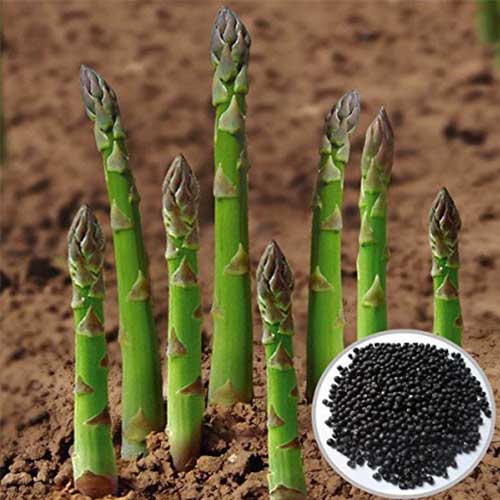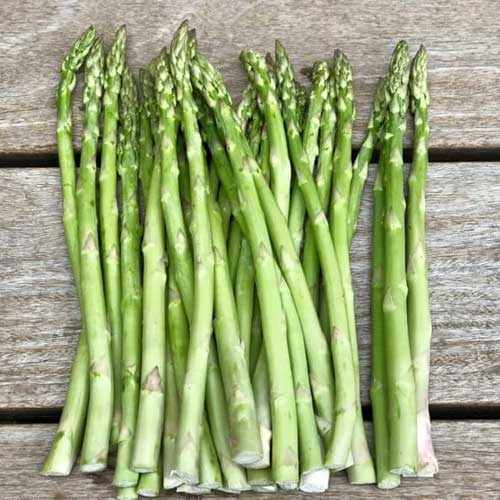Total Number of seeds: 20
Asparagus Seeds produce tall, slender stems with a green color and a hint of purple on the tips. The plants take longer to mature compared to other vegetables, typically reaching full maturity in 180-200 days. Asparagus is a perennial plant, meaning it will keep growing year after year, offering a consistent harvest seasonally. The flavor is fresh with earthy undertones, making it a versatile vegetable perfect for roasting, grilling, or steaming. Asparagus is known for its rich nutrient profile, including high levels of vitamins A, C, and K, and its ability to support overall health and wellness.


In India, Asparagus Seeds should be sown from June to August. These plants thrive in cool, mild climates and require a longer growing period, making them ideal for regions with moderate temperatures.
1. Apply Nutrient-Rich Fertilizers
When your plants begin flowering, use nutrient-rich fertilizers like Organic Bone Meal Powder or Vermicompost. This helps in boosting the bloom and enhances overall yield.
2. Use Organic Fertilizers
Feed your plants with organic fertilizers such as Cow Dung Manure or Neem Cake. Organic options promote healthy soil life.
3. Regular Feeding
Apply fertilizers every 20-25 days to ensure plants receive a steady supply of nutrients. Choose from various options like Cocopeat Compost for moisture retention.
Asparagus produces slender, firm stems with a fresh, mild flavor and a hint of earthiness. The purple-tinted tips add a unique color contrast, making the stems visually appealing. Asparagus is a nutrient powerhouse, known for its high levels of vitamins A, C, and K, making it a highly nutritious addition to any diet.
Asparagus is rich in vitamins A, C, and K, as well as folate and fiber, making it a healthy addition to any meal. The stems can be steamed, grilled, or roasted, adding a unique flavor and texture to a variety of dishes. They are also great for soups, stir-fries, and salads.
When growing Asparagus Seeds, ensure the soil is loose and well-draining. Water regularly to keep the soil moist but avoid waterlogging. Monitor for pests and diseases to keep the plants healthy.
Common issues include pests like asparagus beetles and diseases like rust. To prevent these problems, ensure good airflow and use organic pest control methods. Remove affected stems to avoid disease spread.
Sign in now to receive a 5% instant discount on your first order when using code WELCOME. Begin your organic journey today!
By logging in, you're agreeing to our Terms of Service and Privacy Policy.
Rakesh
Pot mein vertical support diya toh plants tall grow hue aur leaves crisp green the.
Priya
Asparagus flavour subtle aur fresh tha—light steaming ke baad directly plate pe serve kiya.
Renu
Early growth steady rahi aur seedlings transplant ke baad stable lage.
Payal
3★—thoda patience chahiye iss variety ke saath but taste wise it’s very rewarding.
Ajay
Daily watering aur cocopeat use se roots strong ban gaye, perfect for kitchen use.
Amit S
beej ugne me thoda time laga par seedlings strong nikle
Sneha
Compost-rich soil ne plant development fast kiya aur healthy green stalks aaye.
Sunita
Raised bed mein lagaya, aur stalks uniform bane—no hollow centers.
bab sagar
I had sown the seeds and most of them have germinated.. would recommend to everyone
Deepak
Once established, daily care minimal tha—only sunlight aur moist mitti chahiye hota hai.